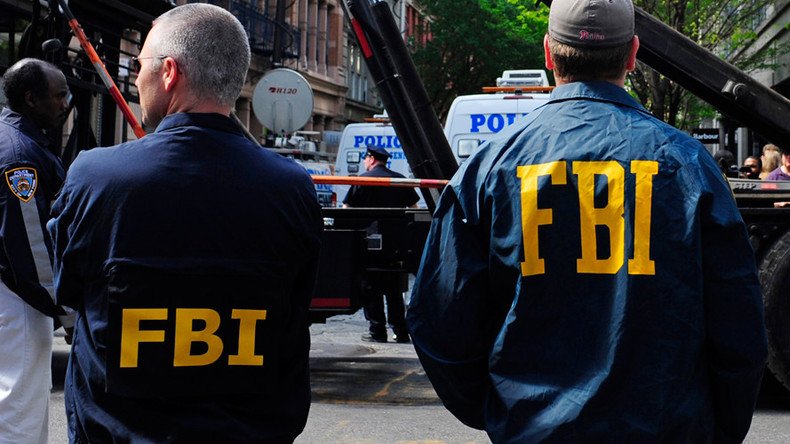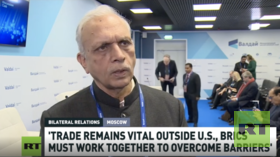FBI must work undercover with ISIS, even during attacks, to climb group's ranks - criminal attorney

Entrapment is never good, it is always harmful, and it is never a way to find the perpetrators of an attack because criminals are going to be able to carry this out, Jennifer Breedon, international criminal law attorney, told RT.
The FBI is being sued by a victim of an ISIS-inspired attack in 2015, during a controversial 'Draw Muhammad' cartoon drawing contest in Texas. The lawsuit alleges the bureau may have been complicit in the terrorist incident by not acting upon early warnings signs.
RT spoke with Jennifer Breedon, international criminal law attorney, for her take on the case.
RT: What do you think about the Garland terror attack controversy?
Jennifer Breedon: Obviously this new case that is coming out is very shocking and surprising. More details are going to be emerging, as the only security guard that was injured, besides the two terrorists that died, is now suing the FBI. It is very troubling to know that not only was the FBI aware of this attack, but likely perhaps complicit in carrying it out and even enticing the two terrorists to carry out the attack in Garland, Texas.
'Draw Mohammed' contest attack accomplice found guilty of terrorism https://t.co/ibKdLjjfRXpic.twitter.com/NxAKl9mh2F
— RT America (@RT_America) March 18, 2016
RT: Why, in your opinion, did the FBI fail to prevent the attack, since they knew about it?
JB: That is what the case is boiling down to. Some of the facts are indicating that they had an undercover agent that was trying to get in with ISIS – trying to find out these ISIS groups, and he wanted to make himself higher up in ISIS ranks to know more of their fighters. Apparently, he stayed in the car behind them, which came out in another case filing with the FBI. They did not prevent it because if the attack had been carried out successfully, and people died, it was likely this undercover agent and his supervisors in the FBI felt that this would promote him up to high ranks within ISIS – the undercover agent would be promoted up, because the attack was then successful. So he did not prevent it for that reason. Now, he didn’t have a legal duty to prevent it, but it is certainly is negligence at the very least, especially if he enticed the two terrorists to come all the way from Arizona over to Texas just so that he could follow them – see that they were doing, and if the attack carried out then he would be able to be further on the ISIS web.
RT: According to statistics, undercover sources are used in more than half of ISIS-related terror cases in the US. So, this is a common thing for the US now?
JB: It is. And it is very sad, because it shows a complete disconnect between lots of US investigative sources. For example, under the Obama administration, news came out under the Department of Homeland Security (DHS), it was shown that they told the (DHS) to stop looking at religious inspiration, in fact if ISIS declares that they are a radical Islamist ideology, you’re not allowed to even consider Islam; you’re not allowed to even investigate if mosques are extremist, if there is extremist preaching coming out. The DHS says law enforcement isn’t even allowed to look at that.
We've updated our ISIS in America numbers (100) and added a new statistic: Average prison sentence (10.1 years). pic.twitter.com/SsAbCx1Tgy
— Program On Extremism (@gwupoe) August 3, 2016
Because of that you have the FBI now going out needing to do these undercover operations to get inside their minds to find out, where the links are, because there is literally no other way under US laws for them to investigate, who’s going to be an extremist and who’s not, unless they pretend to be ISIS themselves and go into this, carrying out things such as the Garland Texas attack, and other things like that. So it is very troubling to see the complete disconnect and how in the DHS - specifically under the Obama era - they were trying to pass these laws to say: "You can’t do anything. You can’t even consider the religion," when ISIS themselves says: it is all about their religion, and I would just spend time in the Middle East.
Muslims in the Middle East, Muslim governments, look at the religion, they look at the mosques, the extremist teachings all the time to find ISIS affiliates. So it is very troubling to think that because we have such a disconnect here in the US between our law enforcement, our FBI agents have to go undercover and commit these egregious things to make sure there is an attack just to get evidence to find ISIS sources.
RT: What do you think about the entrapment practice as a whole? Is it doing more harm or good?
JB: I think right now it is doing more harm. Entrapment always does more harm. So legally speaking, entrapment is just a defense. So it is a defense against a criminal charge. If somebody is charged with a crime, then they can say, “Well, I was entrapped into carrying this out." Legally it just acts as a defense; it can’t be something that you would sue over per se, but entrapment is basically when the government or government affiliates come in and either coerce somebody they think might be linked to terrorism or criminal activities, coerce them into committing a crime, or encourage them to commit this crime, so that the government can then arrest them.
Entrapment is never good, it is always harmful, and it is never a way to find the perpetrators of an attack because criminals are going to be able to carry this out. What we need instead of entrapment, we need to allow investigative bodies - like the DHS and others - to look at the intention of groups like ISIS, whether that’s their religious institutions or other things like that. We need to allow them an investigative authority so that they don’t have to resort to such a dangerous practice like entrapment.













